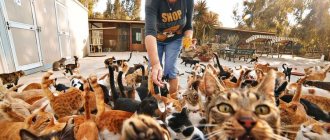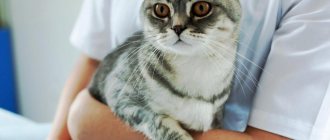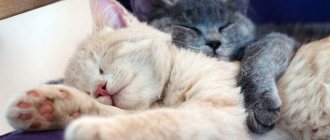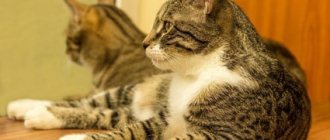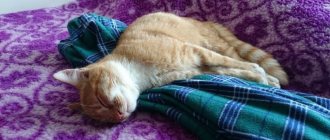The cat became the first animal that was tamed by man in primitive times. Her developed hunting instinct did not go unnoticed. Regularly caught rodents on the territory of the house and land. An animal has become a friend, a companion, a family member, and a weapon against mice and rats. The question of whether cats eat mice or just catch them is asked by many owners after unusual finds in the house. The hunter brings the caught prey to the owners, shows off the trophy, and leaves it in a visible place.
Interesting process
This cute, fluffy, affectionate creature is a natural enemy of field mice, house mice, and rats.
Pests cannot even stand the smell of cats; they avoid their property and fear for their lives. In cats, the huntress instinct is genetically embedded. Even when well-fed, she will not miss the moment to chase a mouse that suddenly appears. The process itself gives pleasure - to catch, not to miss. But whether to kill, eat or not depends on other factors.
Interesting!
A study was conducted in the USA. They crossed purebred cats and yard cats with one cat. The kittens were swapped after they were born. Purebred cats were raised by yard cats. As a result, it turned out that everyone had developed hunting skills. Mothers regularly brought small rodents to their kittens. But further actions were different. The yard worker killed in cold blood, showed how it should be done to the kittens, and gave them to them to eat. The thoroughbred was limited to playing. The conclusion followed was that in order for kittens to start catching mice and eating them, an example is needed. Instinct alone is not enough; skills are also required.
Nutrition question
A hunting cat needs to be fed. She will have the strength to hunt. Moreover, it is not always possible to get a trophy. The cat enjoys the hunting process itself. And only wild and street people eat mice. Also, a hungry cat is more nervous, in a hurry and in many cases misses the mouse. And she will not live long with her stingy owners. He will find a more convenient place in this regard. She becomes attached to a warm home, where she will always be fed. And hunting for her is comparable to entertainment.
Cats often bring their hunting trophies to their doorstep. This is their sign of gratitude to the owners. It's not worth reproaching her for this. Just discreetly throw away the dead mouse.
Often cats bring not only mice, but also frogs, snakes and any things that they like in appearance or smell. In some cases, these may be items of clothing or underwear. Moreover, the cat only carries clean things. Dirty ones - she disdains to take them in her teeth.
If your cat caught a mouse, here are the following options for its subsequent actions::
- She will kill her and leave her on the street.
- He will kill and eat.
- Will kill and bring the mouse into your home.
- He won’t kill, he’ll play and let him go.
One way or another, it is necessary to observe certain hygienic and preventive criteria in order to protect your predator from health problems.
Why does a cat eat mice?
Owners of mouse-cats notice that the latter do not always eat the whole mouse, often being content with its head. The explanation is simple - in the brain of rodents there is a lot of taurine, which enters the cat's body during meals. By the way, mass ailments among domestic cats began after the appearance of the first batches of factory-made food in Europe and the USA, when cats stopped catching mice, as they were forcibly transferred to ready-made diets.
Important! The trio of sulfonic acids (cysteine, cystine and methionine), which support cat health, are also responsible for the quantity/quality of fur, stimulating its growth. It is possible that the cat also realizes the benefits of mouse skin, saturated with the original element, sulfur, which is why it eats the mouse completely and along with the fur.
After some time, the cats began to get sick more, lose their eyesight and suffer from heart disease . After a series of studies, it turned out that the body of cats (unlike dogs) is not able to synthesize taurine from protein foods. Taurine is not for nothing called a sulfonic acid or sulfur-containing amino acid - it is not formed in the body without cysteine (another sulfur-containing amino acid).
Principles of healthy eating
Biologists and doctors know that any amino acid performs two related functions - it supplies building material to protein chains and supplies the body with energy. Often animals need amino acids from outside, since they are not able to produce them themselves . Such amino acids are called essential. In cats, this is taurine - it is not produced in the body, but is responsible for the performance of its main organs.
Zoologists have found that the highest concentration of taurine is found in the retina of a cat's eye (100 times more than in the blood). This is why taurine deficiency primarily affects vision: the retina degenerates, and the animal quickly and irreversibly goes blind.
In addition, taurine takes care of the heart muscle, where it accounts for half of all free amino acids. Taurine regulates the transport (from and inside the cell) of calcium ions, facilitating heart contractions. A lack of amino acids immediately affects the activity of the cardiovascular system, causing such a terrible disease as dilated cardiomyopathy.
Important! Whatever your cat’s diet (natural or made from industrial food), the main thing you must ensure is the presence of taurine in it.
Taurine, recognized as an effective antioxidant, has a number of additional, but no less important tasks:
- regulation of the nervous system;
- formation of active immunity;
- normalization of blood clotting;
- maintaining reproductive functions;
- synthesis of bile salts, without which fats in the small intestine are not digested.
Reasons for behavior
Most often, owners who let their pet outside the premises are faced with the fact that a corpse or half the carcass of a bird or mouse appears in an apartment, country house or dacha. Often, potential cat prey will wander into a city apartment and, having been caught by a furry homebody, will appear on the rug, on the floor, or even in the owner’s bed.
Having discovered a trophy that is valuable from the pet’s point of view in his home, the owner, as a rule, is interested in why cats bring their prey to their owners. There are many guesses about this phenomenon, including incorrect ones.
Some owners mistakenly believe that in this way the pet expresses gratitude for the good attitude towards him, a well-fed and calm life. Others naively believe that signs of attention in the form of the carcass of a caught mouse are a manifestation of love and care for the owner on the part of the cat. However, such explanations do not fully correspond to the motives that prompt the animal to carry a bird or rodent that was caught with difficulty into the owner’s house.
To understand this issue, you must first understand why a well-fed and satisfied pet goes hunting, what prompts the animal to chase a gray mouse with a full bowl of treats?
I bring everything I own home
Of course, the reason for the hunting passion of furry beauties is a strong natural instinct. It is he who pushes even a well-fed domestic cat to an ancient activity - hunting. Being representatives of a large cat family, the pets living with us have not lost the skills of a successful hunter over the centuries of domestication. That is why, even if the bowl is full of the most delicious meat, a domestic cat will not miss the opportunity to hunt a bird or rodent.
The reason that motivates a cat to share its prey with its owner is also based on the instincts laid down by Mother Nature. Zoological scientists put forward several explanations for this behavior of animals, based on scientific data - zoopsychology.
According to one version, the cat, being a territorial animal, is highly dependent on the environment and the room where it grew up and is constantly located. In modern conditions, for a pet, this territory is an apartment, a country house in which it lives. The reason that prompts the animal to bring its prey into the house is often precisely the territorial instinct.
The animal feels that in an alien environment (on the street, in a park, in a garden) the prey can be lost, so it tries to take its trophy to a safe territory that is familiar to it. Being well-fed, not every cat will eat a rodent. Many animals limit themselves only to the excitement of hunting and bring prey to their home.
A killed trophy located on the territory is regarded as a kind of mark for potential enemies. The animal thus shows that this space belongs to it, and all enemies will suffer the fate of prey.
Gift for a friend
Another version of zoologists about why cats bring prey to their owner sounds no less plausible. According to scientists, this behavior of furry pets is due to the fact that a person is the owner, the master, and is perceived by many individuals as a relative.
In the wild, representatives of the cat family often live in families - prides, where there are several mothers raising children. Other members in such a family hunt and bring prey to nursing cats. Owners often become eyewitnesses when a cat father brings a mouse or a bird to a new mother with kittens.
When a cat shares its trophy with its owner, it demonstrates one of the models of such a cat family. According to the pet, the owner is not able to obtain adequate food for himself, and she takes upon herself the responsibility of supplying the family member with provisions.
We recommend reading about why a cat shits on the bed. You will learn about the main reasons for this behavior, the group of animals that most often do this kind of mischief, and methods of influencing a cat. And here is more information about how to stop a cat from tearing up furniture and wallpaper.
Home owner
Do not forget that cats become attached not to the owner, but to the place. In order to show who is boss, they often bring home prey and place it throughout the territory. This is how the cat proves that this territory belongs to her and she can protect it at any time.
Help from mom
One of the reasons why a cat brings mice to its owner is the manifestation of maternal instinct. Especially often the owner is “treated” to his trophy by females with developed maternal feelings. In this case, the animal perceives the person as an object in need of care.
You can often observe the following picture: a cat not only brought a half-dead mouse into the house, but is also trying to “teach” its stupid owner how to hunt it. In this case, the caught prey is regarded as a “teaching tool” for a careless family member who does not know how to catch normal food.
This phenomenon is typical for both unsterilized cats and operated animals. Unable to realize their maternal program, sterilized pets turn all their energy, attention and love to the owner.
Trophy
Some animals bring in prey for collection. Their natural instinct is satisfied, the rodent is caught, the prey is at the mercy of the predator. But why eat it if the house is full of all kinds of delicious things? Let the mouse lie down for a while and then run about its business.
Token of gratitude
Many zoologists and experts in the field of animal psychology believe that the demonstration of hunting achievements in the form of mice, birds and other living creatures brought into the house or even onto the owner’s bed is associated with a feeling of the need to confirm one’s importance for the owner. The pet expresses its gratitude for the food provided to it in such an extravagant way, from the human point of view, and shares its trophy.
The ambiguity of the scientific interpretation of animals demonstrating their hunting victories indicates the versatility of behavioral instincts in cats. The owner’s task is to observe, be attentive and take an interest in the lives of his furry beauties.
To learn why cats carry their prey home, watch this video:
Unhealthy food
Cat owners, especially people living in private properties and houses, rejoice when their pets start hunting for mice - pests of the household, and do not find anything wrong with the fact that the hunter decided to feast on his trophy. On the one hand, eating mice is natural for cats, on the other hand, such a lunch or dinner can turn into a huge problem for the animal, and often for the owner himself.
Rodents, including mice, are carriers of dangerous diseases that can infect a pet and even transfer them to humans through close contact. After eating a mouse, a cat can become infected with the following infections:
- Rabies is a very serious disease that can be fatal if not treated promptly. The danger of this disease is that in the initial stages it does not manifest itself in any way, and at this moment the pet, even during play, can accidentally bite the owner, infecting him in the process. If a domestic cat often hunts mice, the likelihood that he will get rabies is extremely high, which means that such a pet poses a threat to all family members. You can protect animals and people from rabies infection by regularly vaccinating them.
- Trichinosis is caused by parasites - nematodes, which can live in the body of a mouse, and when a cat eats its meat, it can be transferred to it. The disease often affects cats that hunt rodents and eat their raw meat. The disease is characterized by damage to muscle fibers. The disease is very difficult to cure; there is no chance of a person becoming infected through contact with a sick animal.
- Toxoplasmosis is a disease quite common among felines that occurs as a result of eating raw mouse meat. The owner can also become infected from the pet. The peculiarity of the disease is that with primary infection it immediately becomes chronic, but without a symptomatic picture. Complications due to toxoplasmosis can only occur in people with immunodeficiency conditions. Toxoplasmosis is especially dangerous for women during pregnancy. The infection leads to the development of defects and anomalies in the fetus that are incompatible with life. If there is a woman in the family who is expecting a child, it is important to ensure that the indoor cat does not come into contact with street rodents.
- Tularemia is a disease transmitted by mice. A cat who eats their meat and a person who comes into contact with an infected member of the cat world can become infected.
- Salmonellosis is an intestinal infection with an acute course and severe symptoms. The owner can become infected with it from an infected pet who has eaten a mouse infected with salmonella.
- Leptospirosis – cats get this infection from rodents. The disease manifests itself as acute fever.
In addition to the dangerous diseases listed above, a cat can become infected with helminths, lichen and other unpleasant infections from a rodent, which, although treatable, can significantly worsen the pet’s health.
According to numerous reviews from cat owners living in dacha conditions, their pets hunt mice for years, eat their meat and do not get sick at all. Perhaps the fact is that yard cats have a stronger immune system and are naturally adapted to hunting mice. They are less likely to catch an infection from rodents than representatives of various breeds with weaker immunity, slightly impaired due to many years of selective breeding.
There is another danger for cats that hunt and then eat mice. This is a rodent poison. In private homes, people often use various toxic chemicals designed to kill rodents. If a mouse ate poison, and after some time it became a victim of a cat, the toxic substances will penetrate along with the mouse meat into the animal’s body and cause severe intoxication. If there was a lot of poison or it was potent, the possibility of death cannot be ruled out.
How to help an animal if it is poisoned
If a cat has eaten a poisoned mouse, in case of mild intoxication with unexpressed symptoms, it is enough to give the pet a pharmaceutical sorbent, for example, dissolve activated charcoal in water and pour it into the cat’s mouth.
If the intoxication is severe, symptoms such as frequent vomiting, profuse diarrhea, in which blood streaks are present in the stool, and signs of impaired liver or kidney function, cannot be helped on your own. In this case, it is recommended to urgently call a veterinarian or take the cat to a veterinary clinic as quickly as possible.
How to react to the owner
Having understood the reasons why the cat brings mice to the owner, it is necessary to develop the correct behavior in such a situation. First of all, you should not scold or show negative emotions at the sight of a dead bird or mouse, as if
the spectacle did not look terrible.
If a pet, which had the best intentions of feeding or teaching its owner to hunt, is scolded, punished or shown displeasure, this can cause a feeling of mistrust and alienation in the animal.
If you find a dead rodent, bird or other trophy in your home, household members should not panic. As a rule, the prey is already dead and poses no threat. If a hunting trophy shows signs of life, then measures must be taken to kill it safely.
In order not to offend your pet with your inattention, you should thank the animal for the trust shown, caress it and, if possible, remove it to another room. The carcass must be placed in a plastic bag and, sealed tightly, thrown into a trash can. You must wear gloves and then wash your hands thoroughly with soap. The cat should not be present during this manipulation, otherwise it will lose trust and disposition towards its beloved owner.
I don't brag, I care
Sometimes cats bring trophies to their owners. We often humanize our pets and attribute a desire to show off their dexterity and importance. But zoologists have figured out why cats bring prey to their owners. This is how they show they care. The fact that the owner does not eat mice is regarded as an inability to catch them. They bring him not only food, but also a study guide. At least, such care for the flock has been ingrained in animals for a long time. Don’t even think about screaming when you see a rodent or throwing it away demonstratively. Better to praise and stroke. And when you send the victim to the trash bin, do not contact him. It’s unclear where this poor fellow came from.
And in this video you can see how a small cat has already caught a mouse.
Main breeds of rat catchers
Independent hunters are representatives of the Russian Blue breed. They become attached to only one owner, whom they are ready to protect from rodents. Athletic athletes - Chartreux cats - have a beautiful athletic physique, which helps in catching rats and mice.
Maine Coon
This ratcatcher cat is the largest breed; it is an intelligent and selective animal - a good hunter. The Maine Coon reacts with lightning speed to a rodent, and its powerful body and dexterous movements leave no chance for rats and mice. At the same time, he is a sweet and gentle creature who will purr with pleasure in his owner’s ear.
Siberian
The Siberian cat rarely becomes attached to humans, perhaps it has the “wild” blood of its ancestors. This balanced and powerful animal is considered the best rat hunter. Freedom is very important for an obstinate pet; the cat wants to walk outside from time to time. The Siberian cat is capable of developing great speed in running and jumping well. In addition, the animal has an excellent reaction.
European
The cat was common in ancient Rome. She copes well with the duties of a rat catcher. Each representative of this breed is an individual. The animal has a silver marbled or gray color.
Kurilian Bobtail
The animal was brought to us from the Kuril Islands. By their nature, the fluffies of this breed are similar to dogs. The little kitten quickly becomes attached to its owner and tries to take care of him.
Cats can not only deal with a rat, but also drive away a small dog that has entered their territory.
The Kurilian Bobtail has a small tail. The cat has elongated and powerful hind limbs, which allow him to jump and develop great speed while running. The Bobtail can cope with any rat's home.
Siamese
Humans have nothing to do with the breeding of this breed. Siamese cats are fast and graceful. They have a very well developed hunting instinct.
How to raise a hunter?
Some people wonder why a pet, even of the “right” breed, does not catch rodents. For a kitten to become a rat catcher, it must be raised correctly. It is important that his mother herself is a rat catcher and instills in the baby the necessary skills.
If you adhere to certain rules, you will definitely raise a good hunter:
- Encourage the hunting instinct in your baby - praise the animal if it has caught prey.
- Don't starve the animal. Otherwise, the cat will run away or start stealing food from neighbors, collecting in trash cans, and not catching the rat.
- Your pet should be fed in small portions several times a day. The bowl of food should not be left standing all the time.
- The rat catcher should be vaccinated against rabies. If a rat has injured an animal, contact a veterinarian immediately.
Raising a rat catcher on your own is problematic; for this reason, you should not take the kitten away from its mother early. The optimal age is 4–5 months.
Why is sterilization necessary?
Sterilization of pets is an important issue for every owner.
Sooner or later, every owner thinks about sterilizing their pet, especially when the animals begin their mating season. Cats during heat behave restlessly, do not allow the owner to sleep at night, meow loudly and disappear on the street for a long time. But what is most unpleasant for the owner is the appearance of unplanned kittens, which he simply does not know where to place. After all, as a rule, cats give birth two or even three times a year.
The best way out of this situation can only be sterilization of the animal.
This operation is considered simple and usually the cat recovers within a few days and returns to its normal lifestyle.
When to sterilize without harming psychological health
It is advisable to perform the operation before the animal reaches old age.
It is advisable to carry out such an operation as soon as the cat reaches sexual maturity, no earlier than she is eight to ten months old. Older animals tolerate anesthesia much harder and the rehabilitation period for older cats can take several months.
Drugs that reduce libido
Sometimes pet owners prefer drugs that reduce sexual activity to sterilization.
Sometimes owners, not wanting to subject their cat to sterilization, prefer to give their pet drugs that reduce sexual desire during the mating season. This is an extremely undesirable alternative, since over time such tablets can cause the development of tumors and other diseases.
Positive and negative sides of sterilization
Like any surgical intervention, sterilization has both pros and cons.
pros
- The cat does not experience hormonal surges, and it becomes more flexible and balanced.
- The operation significantly reduces the risk of such dangerous diseases as cancer of the uterus, ovaries and mammary glands. The operation allows the cat to avoid many dangerous ailments.
- The cat does not disappear on the street for weeks.
- The pet will not wake up the owner at night with a loud cry.
- The owner will not have to worry about where to place numerous kittens. After sterilizing your cat, you can forget about worries and the question of “where to place all the kittens.”
- Some animals are allergic to anesthesia and in rare cases, a cat may not wake up after being euthanized. In rare cases, a cat may not wake up from anesthesia.
- Sometimes cats become lazy after surgery and may become overweight.
- The cat's character changes. Some pets who have undergone sterilization become nervous and capricious.
- A sterilized cat begins to behave aggressively towards other pets. Aggression in cats is a common side effect after surgery.
It should be remembered that for an animal any operation is stressful, so during this period the cat needs the care and attention of the owner more than ever.
Mice in the diet - harm or benefit
Rodents are as beneficial as they are harmful to cats, at least according to veterinarians who are concerned about the “bouquet” of diseases transmitted by the former. It is believed that mice (like rats) are carriers of infectious diseases that are dangerous both for the pets themselves and for their owners.
The list of such diseases includes:
- trichinosis - difficult to treat and caused by helminths that parasitize the intestines (larvae penetrate muscle tissue and destroy it);
- ringworm ( ringworm ) is a fungal infection that affects the appearance of the coat/skin. The therapy is simple but long-lasting;
- leptospirosis - affects various organs and is accompanied by fever. A cat becomes infected through contaminated water, eating mice or coming into contact with their secretions;
- toxoplasmosis is dangerous for pregnant women and is often asymptomatic. About 50% of rodents are considered carriers of the disease;
- salmonellosis is an acute intestinal infection that threatens humans and animals;
- tularemia , pseudotuberculosis and others.
Hypothetically, a cat that eats mice could become infected with rabies, but this probability is reduced to zero if the animal is vaccinated. The second thing that should reassure the owner is that the virus is transmitted through saliva, that is, the mouse must injure the cat.
Important! Those who live in private homes and keep rat-catching cats say that their animals hunt rat mice for many years, avoiding any infectious diseases. Several generations of cats live to a ripe old age, enriching their daily diet with rodents without tragic consequences for health.
A cat is more likely to be poisoned if it tastes a mouse that has died from the poison used in deratization. If the poisoning is mild, you can get by with pharmaceutical absorbents; in case of severe poisoning (vomiting, diarrhea with blood, liver/kidney failure), call a doctor immediately. Also, when in close contact with rodents, pampered domestic cats often pick up fleas or helminths.
Disadvantages of eating rodents
Hunting for a mouse
Can a cat eat mice? It sounds strange. These are two components of one chain. Cats should eat rodents in the wild, live indoors, but be outdoors frequently. In modern conditions, there are several risks from which pets should be protected.
- Cats should not be allowed to eat mice if there is a risk of poisoning. If neighbors use poison to control rodents, the cat receives a dose of mouse poison.
- The hunter should regularly receive medications against helminths, fleas, and ticks. Rodents are the main distributors of parasites. The pet must be protected.
- All routine vaccinations are required. Mice spread many terrible diseases. Some of them are transmitted to humans through pets after contact with a mouse.
A cat brings prey into the house for several reasons - to brag about its achievement to its owners, to “feed” them, to hide them from barn cats, to eat them later, as a reserve for a rainy day.
Cats eat mice, but not all of them. This requires not only hunting instincts, but also certain living conditions. Yard kittens are capable of conducting the most brutal hunt for rodents already at 5 months of age.

